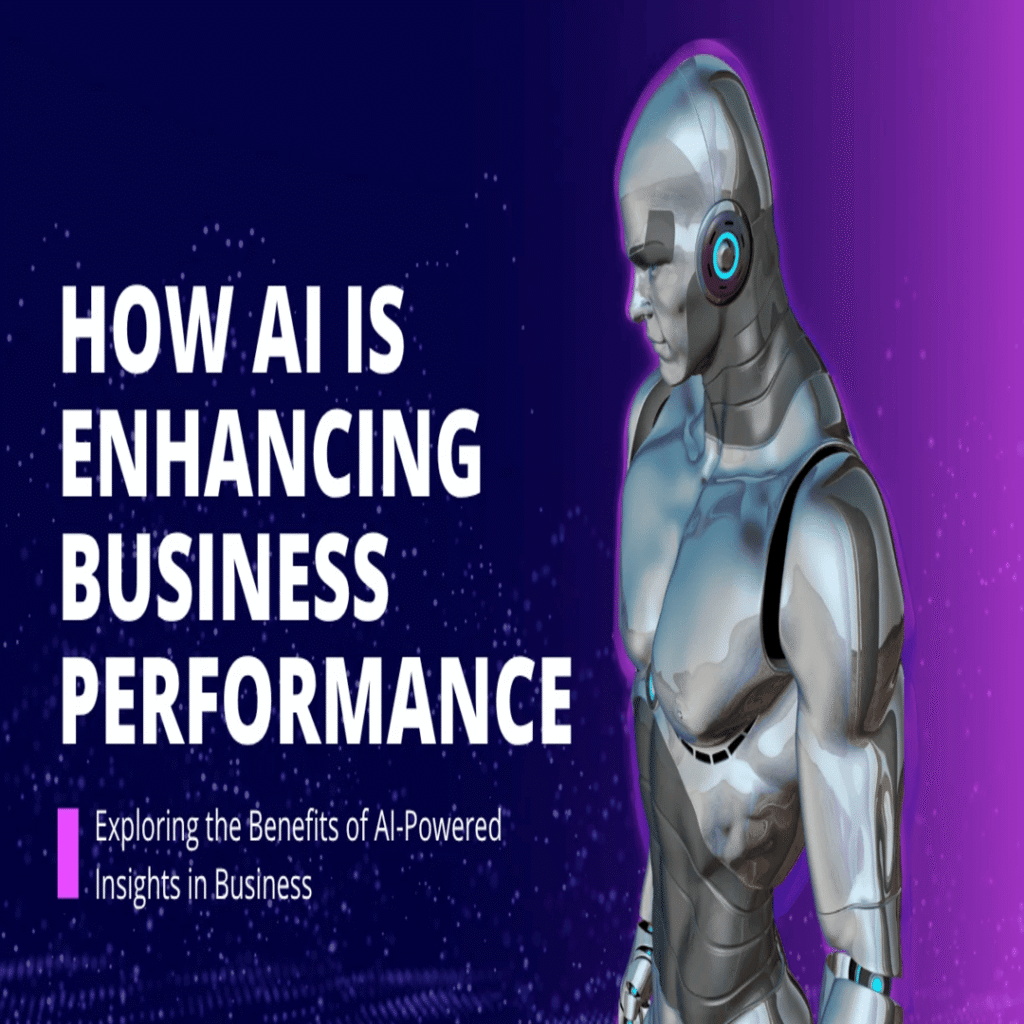In today’s fast-paced digital economy, Artificial Intelligence in Business has evolved from a buzzword to a powerful strategic asset. Businesses across all sectors—from retail and finance to healthcare and logistics—are increasingly relying on AI to automate tasks, gain insights, and innovate like never before.
In this article, we’ll explore the top benefits of using artificial intelligence in business 💡, supported by real-world examples, expert insights, and research-backed data. Whether you’re a small startup or a Fortune 500 giant, understanding how AI can revolutionize your business is essential for staying ahead of the competition.
What Is Artificial Intelligence in Business?
Artificial Intelligence in Business refers to the use of AI technologies—such as machine learning (ML), natural language processing (NLP), and computer vision—to perform tasks that traditionally require human intelligence. This includes analyzing data, automating workflows, personalizing customer experiences, and more.
According to a 2024 report by McKinsey, over 70% of companies worldwide have adopted some form of AI 🌍, and the majority report increased revenue or reduced costs as a direct result. (Source)
1. Enhanced Decision-Making Through Data-Driven Insights
AI empowers businesses to turn mountains of data into actionable insights. Tools like IBM Watson and Google Cloud AI can process vast datasets, identify trends, and recommend actions—far faster than any human team.
Take Starbucks, for example ☕️. By using AI to analyze purchasing patterns, weather data, and even local events, they optimize product offerings and store locations, boosting sales and customer satisfaction. As former Starbucks CTO Gerri Martin-Flickinger notes:
“AI helps us understand what customers want before they even ask for it.”
Moreover, small businesses can leverage AI-powered analytics platforms like Power BI or Tableau 📈 to make smarter marketing and sales decisions without hiring expensive data scientists.
2. Streamlined Operations and Increased Efficiency
AI streamlines repetitive tasks, freeing up human workers to focus on more strategic initiatives. According to a PwC study, AI can automate up to 45% of work tasks 🤯, improving productivity and reducing costs. (Source)
In manufacturing, predictive maintenance powered by AI sensors can foresee equipment failures before they happen. General Electric (GE) uses AI to predict turbine maintenance, reducing downtime by up to 30% and saving millions annually 💰.
Additionally, logistics companies like FedEx and DHL rely on AI to optimize delivery routes 🚚 and fleet management, resulting in faster delivery times and reduced fuel consumption.
3. Personalized Customer Experiences
Today’s customers expect personalized experiences. AI-powered recommendation engines—like those used by Netflix and Amazon—analyze user behavior to suggest relevant products or content. According to a Salesforce survey, 84% of customers say being treated like a person, not a number, is key to winning their business ❤️. (Source)
Sephora, the cosmetics giant 💄, uses AI chatbots and virtual assistants to recommend products based on customer preferences, significantly increasing conversion rates. AI even allows small e-commerce shops to offer tailored shopping experiences, leveling the playing field with larger retailers.
4. Cost Reduction and Resource Optimization
Integrating Artificial Intelligence in Business can result in significant cost savings. AI reduces human errors, speeds up workflows, and minimizes waste.
In the pharmaceutical industry, for example, AI accelerates drug discovery by analyzing molecular data faster than traditional lab testing. According to Deloitte, this reduces drug development time by 40% and cuts costs by billions 💊.
Retailers also benefit from AI-driven inventory management systems that help reduce stockouts and excess inventory. This ensures that products are available when customers want them, boosting both revenue and customer loyalty.
5. Proactive Risk Management
AI excels at spotting patterns and anomalies, making it indispensable for risk management and fraud detection. In the financial sector, banks use AI-driven fraud detection systems that analyze transaction data in real-time, flagging suspicious activities instantly ⚠️.
JPMorgan Chase, for example, uses AI to analyze contracts and identify risks, saving 360,000 hours of lawyer time annually 📜⌛. This highlights how Artificial Intelligence in Business can mitigate legal and financial risks.
Insurance companies also leverage AI to analyze claims, detect fraud, and speed up processing—benefiting both the company and the customer.
6. Accelerated Innovation and Product Development
AI-driven insights from market trends and customer feedback enable businesses to innovate faster. By analyzing millions of data points, AI helps teams identify gaps in the market, develop new products, and refine existing ones.
Nike uses AI to analyze customer behavior 👟, enabling it to launch new product lines that resonate with consumers. Their AI-driven customization platform lets customers design unique shoes, driving both engagement and sales.
Startups also benefit from AI’s ability to rapidly prototype ideas and test concepts, helping them bring innovative products to market faster 🚀.
7. Predictive Analytics for Strategic Planning
Predictive analytics, a key application of Artificial Intelligence in Business, enables companies to forecast demand, optimize inventory, and plan marketing campaigns effectively.
Walmart’s AI-based inventory management system helps anticipate stock levels, ensuring shelves are stocked with what customers need—when they need it 🛒. This reduces waste and improves profitability.
AI-powered financial forecasting helps CFOs make better budget decisions, too, improving cash flow management and long-term growth.
8. Enhanced Talent Acquisition and Workforce Management
Recruiting top talent is crucial for any business. AI tools like HireVue and Pymetrics analyze candidate resumes, video interviews, and social media profiles to assess suitability—saving HR teams hours of manual work ⏳.
According to a Korn Ferry survey, 67% of recruiters say AI has improved their hiring process by enhancing efficiency and candidate quality 👍. (Source)
AI can also predict employee turnover risks and recommend strategies to improve retention and satisfaction—giving HR teams a proactive edge.
9. Optimized Supply Chain Management
Supply chain disruptions can cripple businesses. AI mitigates this risk by forecasting demand, optimizing routes, and even predicting supplier risks ⚙️.
Amazon’s warehouse management system uses AI-powered robots to pick, pack, and ship products faster than human workers, enabling same-day delivery and improving customer satisfaction 🚀.
Even small businesses can leverage AI-based supply chain solutions like Llamasoft to enhance their logistics performance and stay competitive.
10. Strengthened Cybersecurity Measures
With cyber threats on the rise, businesses need robust security systems. AI detects anomalies in network traffic, identifies potential breaches, and responds in real-time ⚡.
Companies like Darktrace use AI to build “immune systems” that learn from network behavior and spot suspicious activities before they escalate 🚨. This proactive approach helps prevent data breaches and protects sensitive information.
According to Cybersecurity Ventures, AI-driven security systems will save organizations over $150 billion annually by 2026—a clear indicator of its immense value 💡.
Real-World Examples of Artificial Intelligence in Business
- Walmart and Target: Both retailers use AI to predict demand and manage supply chains, ensuring customers always find what they’re looking for 🛍️.
- Accounting Firms: The Big Four (Deloitte, EY, PwC, and KPMG) are developing AI audit tools to ensure trustworthiness and compliance in AI systems 📊.
- IBM’s Acquisition of Seek AI: IBM is investing heavily in AI-driven analytics to help businesses harness the power of data 📈.
- TradeXee: Learn more about implementing AI in your business strategy by visiting TradeXee’s AI solutions 💼.
Implementing AI in Your Business Strategy
Ready to embrace Artificial Intelligence in Business? Here’s how to get started:
- Identify Opportunities: Analyze your operations to find tasks that AI can enhance or automate 🔍.
- Choose the Right Tools: Invest in AI solutions that align with your business goals and scale with growth 🧰.
- Empower Your Team: Provide training and support so employees can work effectively alongside AI 👩🏫.
- Measure and Adjust: Continuously monitor your AI initiatives, gathering feedback and refining processes 📈.
Conclusion
Incorporating Artificial Intelligence in Business isn’t just about technology—it’s about transformation. From boosting efficiency and reducing costs to driving innovation and enhancing customer experiences, AI is reshaping the business landscape 🌐.
As AI technology continues to advance, businesses that embrace it will thrive in an increasingly competitive world 🌟. Ready to unlock the full potential of AI? Start your journey today with insights from TradeXee—your partner in AI-driven success 🚀.


